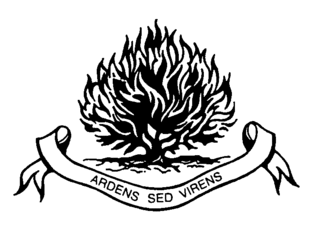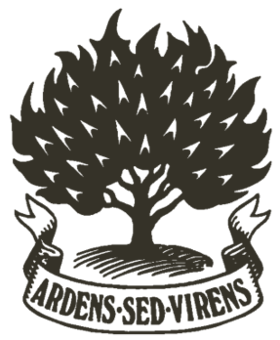
Presbyterianism is a part of the reformed tradition within Protestantism, which traces its origins to Britain, particularly Scotland.
Presbyterian polity is a method of church governance typified by the rule of assemblies of presbyters, or elders. Each local church is governed by a body of elected elders usually called the session or consistory, though other terms, such as church board, may apply. Groups of local churches are governed by a higher assembly of elders known as the presbytery or classis; presbyteries can be grouped into a synod, and presbyteries and synods nationwide often join together in a general assembly. Responsibility for conduct of church services is reserved to an ordained minister or pastor known as a teaching elder, or a minister of the word and sacrament.

The Church of Scotland, also known by its Scots language name, the Kirk, is the national church of Scotland. It is Presbyterian and adheres to the Bible and Westminster Confession; the Church of Scotland celebrates two sacraments, Baptism and the Lord's Supper, as well as five other rites, such as confirmation and matrimony. It is a member of the World Communion of Reformed Churches.

The Free Church of Scotland was a Scottish denomination which was formed in 1843 by a large withdrawal from the established Church of Scotland in a schism or division known as the Disruption of 1843. In 1900 the vast majority of the Free Church of Scotland joined with the United Presbyterian Church of Scotland to form the United Free Church of Scotland. The House of Lords judged that the minority continuing after the 1900 union were entitled to all the assets. While the denomination clearly had a starting date, in their own eyes their leaders had a legitimate claim to an unbroken succession of leaders going all the way back to the Apostles.
The United Free Church of Scotland is a Scottish Presbyterian denomination formed in 1900 by the union of the United Presbyterian Church of Scotland and the majority of the 19th century Free Church of Scotland. The majority of the United Free Church of Scotland united with the Church of Scotland in 1929.
The United Presbyterian Church of Scotland (1847–1900) was a Scottish Presbyterian denomination. It was formed in 1847 by the union of the United Secession Church and the Relief Church, and in 1900 merged with the Free Church of Scotland to form the United Free Church of Scotland, which in turn united with the Church of Scotland in 1929. For most of its existence the United Presbyterian Church was the third largest Presbyterian Church in Scotland, and stood on the liberal wing of Scots Presbyterianism. The Church's name was often abbreviated to the initials U.P.
Rt. Hon. Rev. Dr Robert Thomas William McCrea, Baron McCrea of Magherafelt and Cookstown, D.D. is a Free Presbyterian minister from Northern Ireland. A former Democratic Unionist Party politician, he represented South Antrim and Mid Ulster as their Member of Parliament.

The Free Presbyterian Church of Scotland was formed in 1893 and claims to be the spiritual descendant of the Scottish Reformation: its web-site states that it is 'the constitutional heir of the historic Church of Scotland'. It is occasionally referred to by the pejorative term the Wee Wee Frees. Although small the church has congregations on five continents.
The Presbyterian Church of Eastern Australia (PCEA) is a small Presbyterian denomination which was formed in Sydney on 10 October 1846 by three ministers and a ruling elder. As of December 2012 it consists of 13 pastoral charges with a total of 17 regular preaching points, 12 serving ministers, 1 minister without charge, 6 retired ministers and a community of about 800.

The Presbyterian Church in Canada is a Presbyterian denomination, serving in Canada under this name since 1875. The United Church of Canada claimed the right to the name from 1925 to 1939. According to the Canada 2001 Census 409,830 Canadians identify themselves as Presbyterian, that is, 1.4% of the population.

The Free Church of Scotland is an Evangelical and Reformed Presbyterian denomination in Scotland. Historically it comprised that part of the original Free Church of Scotland that remained outside the union with the United Presbyterian Church of Scotland in 1900. It remains a distinct Presbyterian denomination in Scotland.

The Free Presbyterian Church of North America (FPCNA) is a Presbyterian denomination in the United States and Canada with mission works in Liberia, Jamaica, Haiti, and Kenya. Originally consisting of North American congregations under the auspices of the Free Presbyterian Church of Ulster, the North American group became a separate denomination in May 2005.
The Free Presbyterian Church of Victoria, also known as the Free Church of Australia Felix, was an Australian Presbyterian denomination founded in Melbourne, Victoria in 1846 as a result of the Disruption of 1843 in the Church of Scotland.

The Presbyterian Church in Ireland is the largest Presbyterian denomination in Ireland, and the largest Protestant denomination in Northern Ireland. Like most Christian churches in Ireland, it is organised on an all-island basis, in both Northern Ireland and the Republic of Ireland. The church has approximately 225,000 members.

Geneva Reformed Seminary is a small theological school in Greenville, South Carolina accredited by the Association of Reformed Theological Seminaries and supported by the Free Presbyterian Church of North America. The seminary offers a B.D. and an M.Div. Initially called Whitefield College of the Bible after a companion school in Banbridge, Northern Ireland, the seminary was renamed in 2002 to avoid confusion in the United States where Bible schools and seminaries prepare students at different academic levels.

The Reformed Presbyterian churches are a communion of Presbyterians originating in Scotland in 1690 when its members declined to be part of the establishment of the Church of Scotland. The Reformed Presbyterian churches collectively have a little over 9,538 members worldwide in Northern Ireland, the Republic of Ireland, Scotland, France, the United States of America, Canada, Japan, South Sudan and Australia.
Angus Morrison, is a minister of the Church of Scotland who was Moderator of the General Assembly of the Church of Scotland 2015–2016. He had been nominated for the role a year earlier but withdrew because of ill health. He is an Honorary Chaplain to the Queen, appointed in 2006.
Martyn C. Cowan is an Irish Presbyterian minister and lecturer in Historical Theology at the Union Theological College, Belfast.











